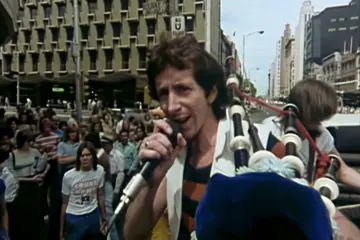Director Steven Spielberg once again dips into America's past for inspiration. This time taking a tilt at the darker days of the Cold War, with Bridge Of Spies.
Tasked to defend a captured Communist spy, insurance lawyer James B. Donovan (Tom Hanks), soon finds himself dragged into a world of espionage and Cold War paranoia. When a spy plane is shot down over the USSR, Donovan becomes the conduit through which the two superpowers can negotiate. If a prisoner swap is to be arranged, Donovan must go behind the newly constructed Berlin Wall to negotiate with representatives of the Soviets. As neither side is willing to officially acknowledge such dealings, Donovan must go into East Germany by himself, in an attempt to understand what the other side actually wants.
There is an effortless grace to Bridge Of Spies. The story unfolds at its own pace, unburdened by ponderous exposition, rather carefully outlining events with an economy of style. Nothing is wasted, with many of the elements of the script receiving call backs later in the progression. Everything receives some degree of pay-off, not a single thing is extraneous. This is a richly crafted script (penned by Matt Charman and the Coen brothers) handled by an expert director at the top of his game.
Hanks is once again the noble avatar of the American dream. This time in the form of real life lawyer James B. Donovan. He is initially the personification of the notion of fair trial, and later that of diplomatic conflict resolution. His struggles in this regard of upholding an ideal that a country aspires to, in the face of paranoia, mob panic and political expediency, are particularly relevant. Spielberg draws some pretty obvious comparisons between cold war tension, and the similar tensions of the “War On Terror”. In Bridge Of Spies, he certainly praises those sticking to the better angels of human nature, rather than those perusing an “any means necessary” approach.
Yet Donovan is also a lawyer, which implies a competent horse trader when the needs of the client demand it. From Hank's first words, we are presented with a silver tongued advocate capable of holding his own (unless he unwisely attempts to bring such sophistry to the family dinner table). It adds a degree of edge to Donovan and allows for both the initial court room drama, and the later unofficial diplomacy and brinkmanship. It is a necessary edge to what could easily be an overly saccharine character. Hanks himself must take some credit for this, imbuing the character with layers and mannerisms, so at times you are not entirely sure what is genuine and what is posturing for advantage.
Don't miss a beat with our FREE daily newsletter
This is a perfect insight into the era of Cold War paranoia. Spielberg masterfully recreates the atmosphere and the tensions of the period, but at the same time gives us the ideals of something nobler.
Originally published by X-Press Magazine















